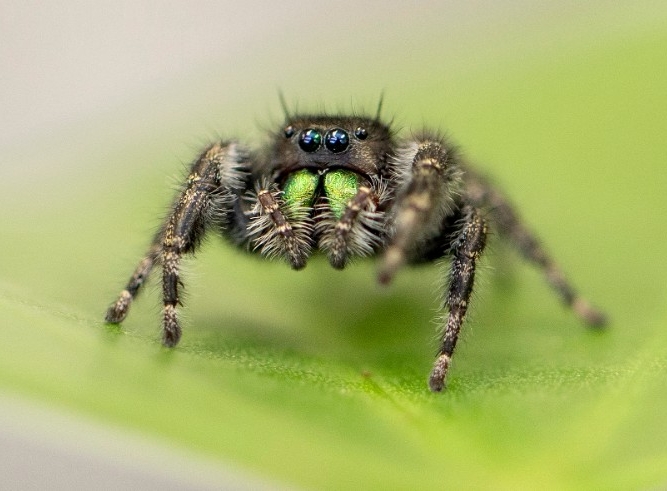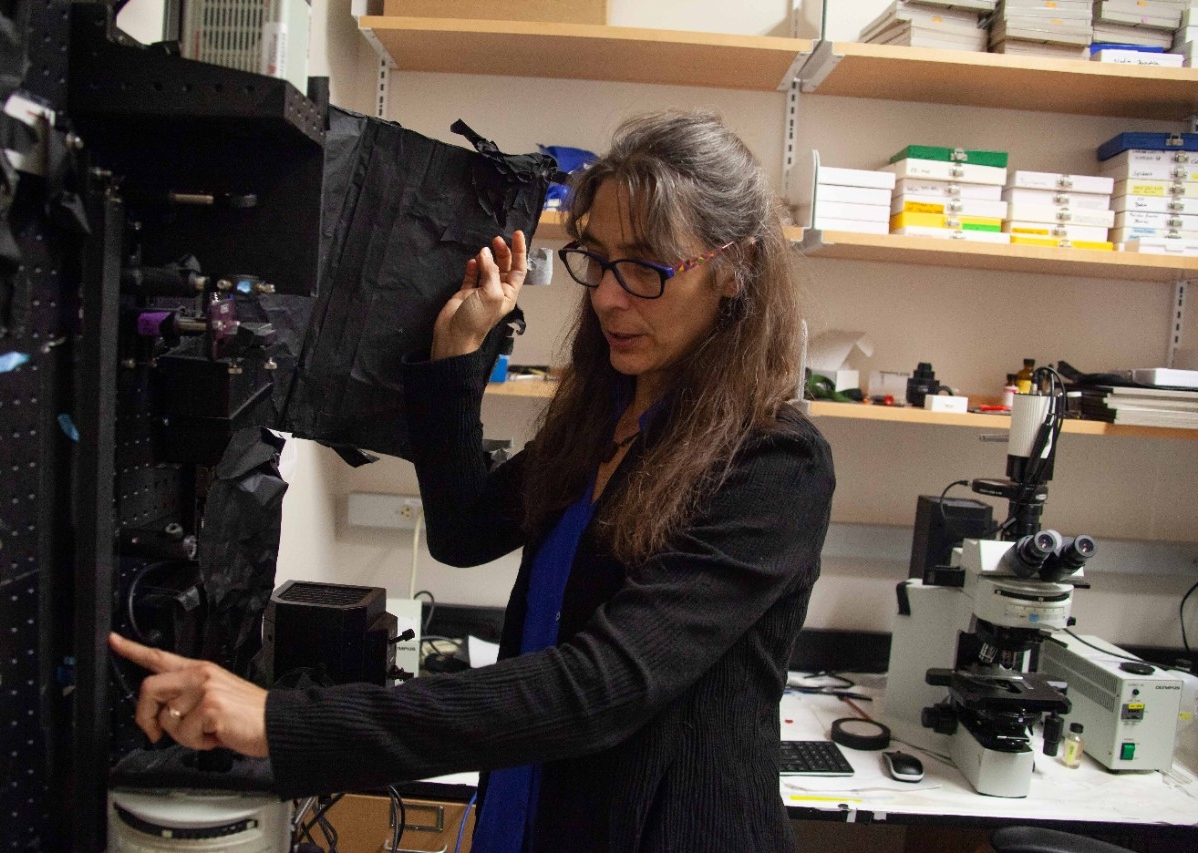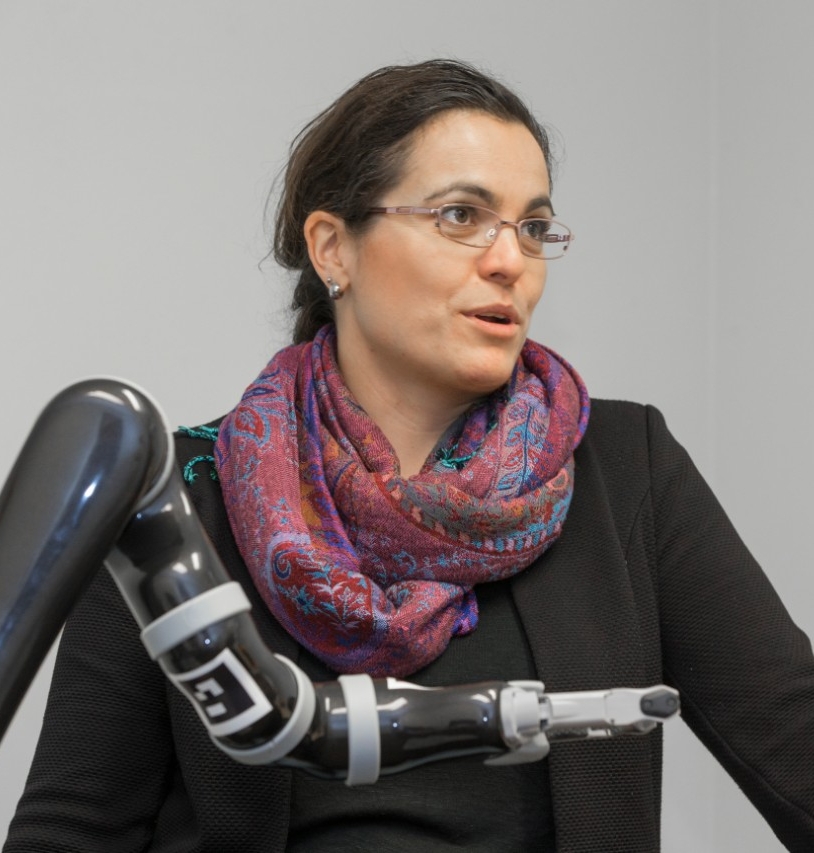
New UC collaboration focuses on senses
Institute for Research in Sensing will draw from STEM and non-STEM fields
The University of Cincinnati has launched a new institute to study sensing in all its forms, from human and animal senses to the sensor technologies that enable our modern lifestyles and provide medical care.
The Institute for Research in Sensing will bring together collaborators from the UC College of Arts and Sciences and the College of Engineering and Applied Science to conduct research, search for solutions to pressing issues and even explore sensing through art and the humanities.
“We’re attempting something a bit more adventurous than in the past — bringing in the humanities, social studies and the arts,” institute director and associate professor Nathan Morehouse said.
UC researchers in both colleges are at the forefront of developing new sensors to diagnose disease, monitor wellness and help drones, robots and cars navigate autonomously, among countless other applications. The interdisciplinary research institute is dedicated to exploring sensing research and sensor technology through novel routes to innovation, Morehouse said.

UC associate professor of biology Nathan Morehouse is director of the new Institute for Research in Sensing that will draw from from diverse disciplines across UC's colleges. Photo/Jay Yocis/UC Creative + Brand
Morehouse studies animal senses, particularly the incredible vision of jumping spiders. He led a National Science Foundation project on spider vision that has taken him around the world in his Morehouse Lab.
The institute welcomes both STEM and non-STEM perspectives, including basic and applied research, medicine, engineering, the humanities, social sciences and fine and performing arts.
What do the humanities have to do with sensor design?
“Consider the role of speculative fiction in imagining novel technologies. A lot of things we take for granted as everyday technologies first appeared in things like science fiction,” Morehouse said.
It’s a matter of asking the right questions in this space.
Nathan Morehouse, Director of UC Institute for Research in Sensing
Sponsored by the two colleges and a grant from UC’s Office of Research 2030 initiative, the institute will launch a new interdisciplinary graduate research fellowship this year, offering positions to 16 graduate students.
The institute also will launch a new public discussion series on topics relating to sensing with presentations from diverse backgrounds that will take on controversial topics such as body cameras in policing.
Some questions that may be covered include, “How long is data stored? Should citizens have access to it?” Morehouse said.

UC biologist Nathan Morehouse unlocks secrets about animal vision in his lab. Photo/Joseph Fuqua II/UC Creative + Brand
Other topics could include speculation about the future of technology and what ethical and societal issues it could raise.
“Think about ‘hacking’ our bodies — implants that expand our ability to see or sense, such as artificial retinas or new ways to sense neural activity and brain states,” he said.
The public program, called the IRiS Alloy Discussion Series, will begin this coming fall. And the institute plans to launch a new event in 2022 focused on innovation breakthroughs and the latest developments in sensing research and development.
“IRiS provides a mechanism to bring together diverse teams of students and researchers with unique viewpoints on sensing through the lens of the entire sensing life cycle,” UC chemistry professor and Ohio Eminent Scholar Ryan White said, also a member of the institute’s leadership team.
“By taking into consideration everything from the ideation and creation of new sensing strategies to the implementation and utilization of these strategies with careful consideration of the ethical implications,” White said, “sensing-related research and education will be more responsible and impactful.”

UC professor Elke Buschbeck uses a custom ophthalmoscope to study animal vision in her biology lab. Buschbeck will serve on the leadership team for UC's new Institute for Research in Sensing. Photo/Ravenna Rutledge/UC Creative + Brand
UC professor Elke Buschbeck, a biologist and neuroscientist, is another leadership team member. She said the benefit of the institute is harnessing the collective talents of researchers and scholars across UC’s many departments.
“At UC we have an unusual wealth of researchers who already work on many aspects of sensing, but they are distributed all over campus and are working in many different units from specific angles,” Buschbeck said. “As such, they are often isolated from each other and may not even know of common interests. IRiS is designed to be a home to all of them and will foster a level of synergism and exploration into all aspects of sensing.”

UC assistant professor Tamara Lorenz studies human-robot interaction in her lab. She serves on the leadership team of UC's new Institute for Research in Sensing. Photo/Joseph Fuqua II/UC Creative + Brand
Buschbeck said the new institute is founded on UC’s principles of diversity and inclusion. It will prepare graduate students to help the university’s many industry partners address their most pressing issues.
“There are two novelties here,” Buschbeck said. “First, the composition of the teams in which each student brings aspects of their field to the table. This will allow them to gain profound cross-disciplinary insights through their interactions.
“Second, the problem they are solving will be posed by an external partner,” she said. “These are real-world problems that will allow them to gain insights into applied fields and foster early relationships between students and potential future employers.”
Morehouse said besides the important technical research, the institute will consider bigger questions about humanity, human health and sustainability.
“It’s a matter of asking the right questions in this space,” Morehouse said.
Featured image at top: The University of Cincinnati has launched a new institute to study sensing. Photo/Jared Erondu/Unsplash
Innovation Lives Here
The University of Cincinnati is classified as a Research 1 institution by the Carnegie Commission, is ranked in the National Science Foundation's Top-35 public research universities and secured a spot on Reuter’s World’s Most Innovative Universities list. UC's students and faculty investigate problems and innovate solutions with real-world impact. Next Lives Here.
Related Stories
Creating a stronger community on and off campus
April 23, 2025
UC student leaders discuss the need for better student-neighborhood relations and a desire to build a better community on campus. Student Body President Joshua Copley and Student Body Vice President Wilani Alicea are being their term with UC Student Government.
‘This is rocket science’
April 23, 2025
At the University of Cincinnati’s Hypersonics Lab, students pursue new technology for high-speed travel and exploration.
Biomedical engineer charts unique course to Herman Schneider...
April 23, 2025
Teresa Hawk, a fifth-year biomedical engineering student, always wanted to make an impact in healthcare. Her affinity for math and science and her unique understanding of what it’s like to be a patient led her to pursue biomedical engineering. Before graduating from the University of Cincinnati’s College of Engineering and Applied Science in May 2025, she was awarded the 2025 Herman Schneider Medal from the college, honoring her hard work and commitment to the university’s cooperative education (co-op) program.
